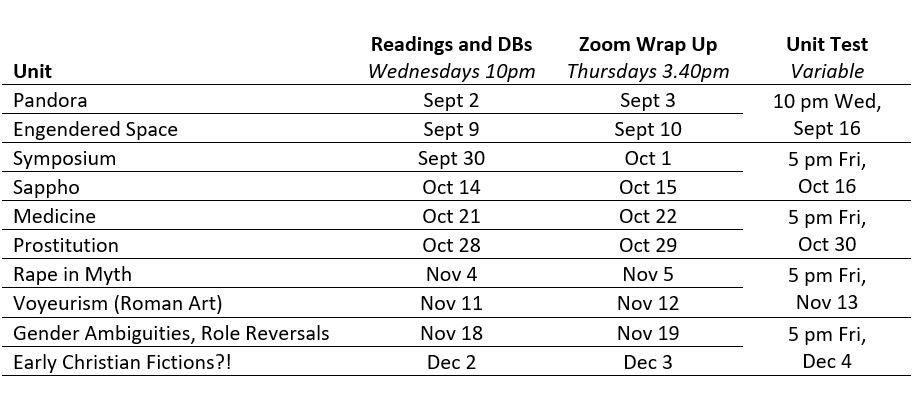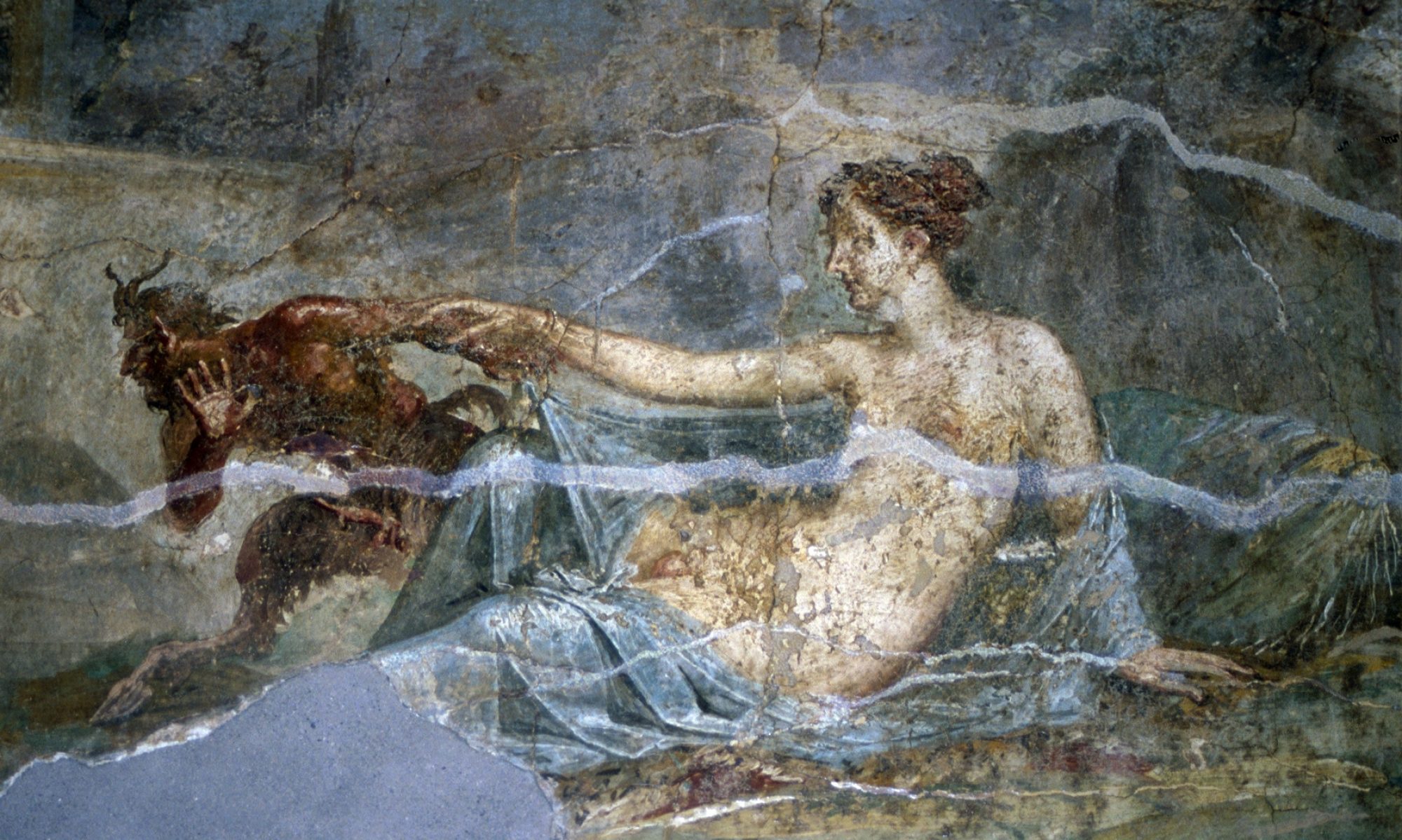A Brooklyn College OER
CLAS 4032 = WGST 3715
Gender and Sexuality in Ancient Greece and Rome
3 classroom hours plus conference and independent research; 4 credits
An exploration into the ways in which individual sexual experience was categorized and evaluated by society in the ancient world, with special attention to questions of gender role, sexual orientation, and the intersection of the personal and the political. Evidence from such literary and nonliterary sources as lyric poetry, epigram, drama, oratory, history, philosophy, epigraphy, and the visual arts. Emphasis on research methodologies.
Prerequisite: English 1012 [2] and at least sophomore standing; or permission of the chairperson.
Instructor
Liv Mariah Yarrow, Professor, Classics
I appreciate a formal style of address in emails. Please address me as Prof. Yarrow. I use she/her/hers pronouns.
Office: 2407a Boylan Beaming into realms of Blackboard and Zoomlandia from a home office in PA
Email: yarrow [ at ] brooklyn [ dot ] cuny [ dot ] edu
Office Hours: By videochat M-Th 10-11 am, but must be requested via email by 9:30 am day of desired meeting. I will respond to your email request with a link that will connect us for video chat.
If in the unlikely event you need to leave me a message by phone, 718 951 5191 is the Classics Department main office number. [No one is on campus, but I’m still supposed to give you this info]
About this Course
The class covers topics from both Greece and Rome and encourages students to bring their own lived experience and previous academic training to the questions we pose. As a class we want to explore diversity and change in ancient social norms. We address a whole host of questions that are especially relevant today but some of those that come up again and again I thought I’d share with you here. So we will ask “What sexual desires did ancient peoples distain, reject, or deny? And why?” Likewise we’ll ask “what types of bodies did ancient peoples distain, reject, or deny? And, are there connections or disconnections between these attitudes and those related to sexual desire?” “How and where to these ideas about bodies and desires intersect with expectations and the lived experiences of social class and hierarchies? What doors are open and shut depending on personal status?” Such hierarchies cannot be separated from ancient perceptions of race and the practice of slavery– in turn, both race and slavery obviously intersect with ancient beliefs and experiences around gender and sexuality.
All of this might sound familiar from other classes in a whole host of academic disciplines, but one thing that sets this class apart is the nature of the evidence. We will spend a great deal of time talking about what survives over the millena and why. What have we lost? How do we do justice to our interpretations of the fragments that do survive. Is there a right way to SEE this material?
The other major theme of this class is how what we SEE says about OURSELVES and OUR culture today. This is called classical reception. Greek and Roman antiquity has lived large in the imaginations of many peoples in many ways but often it is used to express and ideal and often that ideal is about gender and the body.
This is a four credit course; that’s more time and work than your average 3 credit class–one 1/3 more work! There are no textbook costs and while I offer short weekly full class discussions of about 45 minutes each Thursday at 3.40 these are optional and recorded with distribution limited to class members only. The course culminates in a substantial final research paper something you might consider an undergraduate thesis. Because of this we spend lots of time focusing on research methodologies and most of your assignments are pieces of work that feed into the work of developing that final paper. I support you every step of the way from making sure your question can be answering in the time allowed to helping you navigate online databases to working on structuring of your argument and the discussion of each piece of evidence. You won’t go it alone!
Official Objectives of Course
[NOTE: these goals were last revised a decade ago and are slated to be revised in the coming year or so. If they seem out of date, they probably are.]
This course is designed to help you meet following the overall program goals for the Classics Major :
To a lesser extend you may have the opportunity to apply your language learning, if you’ve already studied Latin or Greek. This is not a course requirement, but only an available option that intersect with another program goal:
Because this is an upper level course with a focus on research methodologies and a significant independent research component, goal (e) above is given greater focus. Goal (f) will be touched on mostly informally in class discussions and in online discussions.
Points of Information
Readings and class discussion will cover potentially sensitive topics including contemporary politics, sex, gender, violence, race and ethnic identity, and religion. Students will be expected to treat viewpoints different from their own with respect.
The work for this course is anticipated to required 140 hours total. This is standard for a 4 credit course regardless of delivery format (in person, online, hybrid, etc). This is college-wide policy. And conforms to national higher education best practice. See the current Bulletin.
In practical terms this means each of our 10 units should take you a little more than 9 hours to complete the readings (including making annotations), discussion board. This same pool of time should account for your participation or watching of zoom meeting and quiz completion. Your final research project and all the preliminary steps along the way should take about 47.5 hours spread over the whole semester. You may find that the units take you less than 9 hours, if so this time should be allocated to to your final project. Or you can think of it this way: you need to put in 1 hour and 24 minutes to earn a single point towards your final grade in this class. Less time spent = lower course grade.
You can earn extra credit (1 e.c. point) by creating a schedule that shows when specifically you plan to complete this work and emailing it to me! I’ll give you double e.c. if your schedule shows when you’re allocating time for your other classes as well.
If you are taking this course for ELECTIVE CREDIT (not for your major or minor), you may take it Pass/Fail. I highly recommend this option: you will enjoy the course much more without the pressure of the grades. However, you MUST APPLY by Monday September 7.
Any student who faces challenges securing their food or housing and believes this may affect their performance in the course is urged to contact the Office of Student Affairs for support (Emergency Grants, Food Pantry). Furthermore, please notify the professor if you are comfortable in doing so. This will enable her to provide any resources that she may possess.
Required Materials
All readings will be posted on the website or BB and are free of cost.
If you are struggling with access to technology, the college has loaners and I can help you access these if need be.
Graded Aspects of the Course
Late work loses 10% of its graded value each 24 hour period that its submission is delayed. Thus no submissions are accepted more than 10 days after the due date. Extensions on assignments will be given only for excused reasons: religious observance, illness requiring a visit to a health clinic, death of close relative or friend, etc.
66% Instructional Units
9% surveys, quizzes on course expectations, intro materials, signing up on time, and further instructional engagement (attending/watching zooms, using virtual office hours, other supplemental instruction)
19% Tests. These are taken in a timed environment on Bb and consist of open ended questions testing comprehension and retention of information, usually you’ll have a choice of questions. Each of the 5 tests covers 2 units. I drop your lowest grade.
19% Discussion Boards (Thus each unit DB is worth about 1.9 points towards your final grade, but I drop your lowest score.) Main expectations: answers questions posed by the instructor by drawing on course material, engagement with answers and evidence offered of by classmates, bring something new to the conversation.
19% Annotations of the readings using Hypothes.is (Thus each unit readings is worth about 1.9 points towards your final grade, but I drop your lowest score.)
34% Research Project
2% – Attending at least three individual or paired Zoom meetings with the instructor regarding your project over the course of the semester. Scheduled at your convenience.
1% – footnote worksheet
5% – annotated bibliography (8 pieces of secondary literature (peer reviewed articles or book chapters), Chicago style citation, with annotations discussing relevance to topic and identify primary evidence discussed.
3% – article (secondary literature) analysis
3% – primary evidence worksheet
3% – Completion of Draft Thesis Statement worksheet including, Sample Paragraphs, and Rough Outline
2% – Feedback on Peer Draft
15% – Final Paper (3,000-4,000 words, Chicago style format, must discuss no less than 3 pieces of primary evidence and cite no less than 15 pieces of secondary literature published in the last 20 years). Final grade is penalized if drafts are not turned in on schedule.
Calendar
The course Google calendar is the best overview of everything. I recommend adding it to your own personal calendar to get notifications. It is also embedded and displayed at the bottom of this page.
This is the same information in list format:

Official Language
I do not scale or curve grades.
The faculty and administration of Brooklyn College support an environment free from cheating and plagiarism. Each student is responsible for being aware of what constitutes cheating and plagiarism and for avoiding both. The complete text of the CUNY Academic Integrity Policy and the Brooklyn College procedure for implementing that policy can be found at this site: http://www.brooklyn.cuny.edu/bc/policies. If a faculty member suspects a violation of academic integrity and, upon investigation, confirms that violation, or if the student admits the violation, the faculty member MUST report the violation.
A violation of the Academic Integrity Policy will result in at minimum the student receiving a failing grade for the assignment, further sanctions may include but are not limited to a failing grade for the course.
In order to receive disability-related academic accommodations students must first be registered with the Center for Student Disability Services. Students who have a documented disability or suspect they may have a disability are invited to set up an appointment with the Director of the Center for Student Disability Services, Ms. Valerie Stewart-Lovell at 718-951-5538. If you have already registered with the Center for Student Disability Services please provide your professor with the course accommodation form and discuss your specific accommodation with him/her.
I also respect the state law regarding non-attendance because of religious beliefs (see the undergraduate Bulletin); please inform me if this affects you at any point during the semester.
Important Dates
Aug 25, Tu – Last day to drop for 100% refund
Aug 26, W – official start of Fall semester
Sept 1, Tu – Last day to add a course, Last day to drop with no transcript indication
Sept 7, M – last day to file for P/F option
Sept 11, F – last day to change major/minor/concentration for F20
Sept 15, T – last day to file for graduation Fall or Winter, last day to drop
Nov 6, F – last day to withdraw
